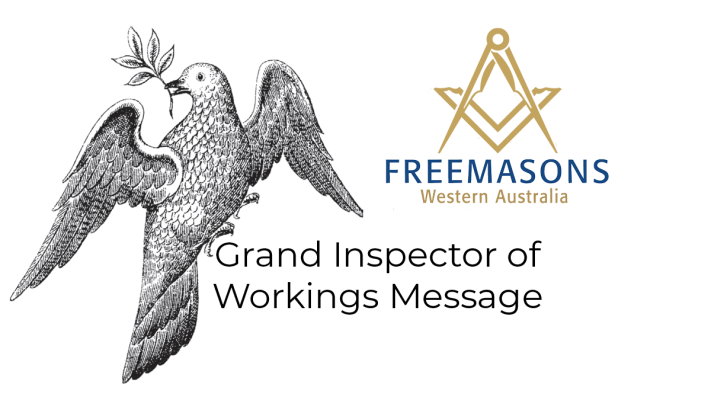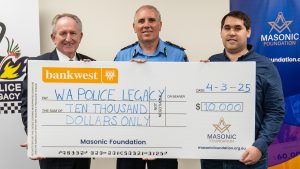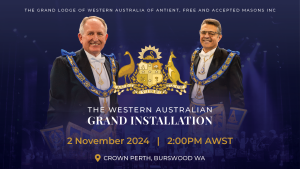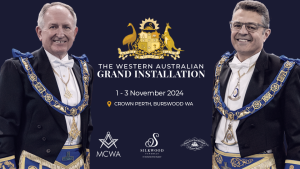
Grand Inspector of Workings Message August 2023
Brethren,
Over my time and the privilege as a Grand Officer and as a private citizen I have heard many a speech, proposal, or lecture – some awe-inspiring and some not. Public speaking does not come natural to me, in fact it terrifies me as a person who stutters; this said, I have over the many years listened to and mentored myself on people I considered good public speakers.
This brings me onto the subject of proposing toasts within Freemasonry.
As the DepGIW and in conjunction with the Grand Inspector, I aim to bring not only to current and budding Worshipful Masters some ‘tips for young players’ but to all brethren general pointers to hopefully provide the confidence of taking that step into the challenge of what the Craft brings us to be better men.
Additionally, I aim to provide those tips on various things to avoid / not to do generic to all brethren.
A few years ago, I was given the ubiquitous black case of a 65-year serving brother who had ascended to the Grand Lodge above, which amongst other items, contained a publication printed in 1962 by an eminent brother RWBro RHD Hewitt who was at the time the editor of ‘The West Australian Craftsman’. This specific publication referred to is titled ‘Responsibilities of the Worshipful Master’.
Despite the period the booklet was written, in the ‘hay days’ of the Craft in our Constitution, this publication contains a wealth of information to read and digest for all brethren, regardless of rank or position; it’s just as relevant today as it was then.
So, on this occasion I have replicated two (2) subjects that piqued my interest immediately, that of proposing toasts and the facets around the DGIW. Please note it is written as it was in the day.
If you can get your hands on an original copy or a duplication, do so, it will be worth the effort – I hope you find these articles useful and encourage conversation.
Fraternal regards,
Steve
VWBro Stephen White PGIW DepGIW
PROPOSING IMPORTANT TOASTS
During their year of office Masters often delegate to others the making of important toasts. There may be good reasons why this is done, of course; the person delegated may have a better knowledge of the requirements, but the chief reason, I venture to say, is not modesty but inability. Sympathy for a poor speaker, therefore, should not cause us to overlook the fact that the Master is not only the ruler but the spokesman of his lodge and to him falls the duty of giving expression to what the lodge thinks. Facility in the art of public speaking is a great advantage and the following hints may be useful to Master and Masters-elect.
THE GRAND LODGE TOAST
We hear some uninspiring efforts in proposing the Grand Lodge toast at installations and while there is always sympathy and understanding for the unfortunate Master struggling with stage fright there is also a feeling of disappointment that the lodge is being let down on a gala occasion. A Master must do better if he is to justify his election.
The Grand Lodge toast is the easiest of all Masonic toasts because it so readily conforms to the accepted patten. Expert speakers may like to embellish it with verbal pyrotechnics by the average run-of-the-mill Master can make a very acceptable proposition if he sticks to the simple rules of speech-making. Basically, no matter who the Grand Master may be, the Master should;
- Express the lodges loyalty to the Grand Masters lodge;
- Express appreciation of the Grand Masters work as an individual; and
- Express a welcome to the Grand Master or his representative, and, if the latter, a reference to him and to his escort.
The Grand Master is the ruler of the Craft. He epitomises the Masonic law which regulates the Craft and keeps the various lodges in orbit. He is the centre to which our Masonic loyalty flows. A sentence or two expressing the lodges appreciation and affection is usually a good way of commencing the toast.
Grand Masters invariably are distinguished citizens; that are recognised as such by the community as well as by Masons. They have good records of public service. A few words of appreciation of these factors could then follow.
The welcome to the visitor as a person comes next and could be coupled with some information about the lodge, its history, the progress it is making, and distinguished brethren, its hall, the district, and any matters of interest. The welcome would conclude with an appreciation of the kindness shown by the visit and hope that he and his offers will enjoy their stay.
This need take no more than two to three minutes but it would contain some meat and would give the Grand Master or his Representative something on which to hang his reply. So often are they left in mid-air and have to compose a response on nothing that they are grateful for anything that will help. The brethren look forward to hearing something interesting from the principal guest and they are not greatly concerned in listening to the Worshipful Master at that point. So, the proposal should be brief but have two or three points of interest.
When the Master sets out to reply to his own toast, he should confine himself to expressing appreciation for the nice things said by the proposer and his confidence in the lodge and the officers.
He may thank the brethren fore electing him to be their Master and pledge himself to do his best.
Personal matters should be kept to a minimum.
DISTRICT INSPECTORS
When the District Grand Inspector of Workings (DGIW) pays his visit, he should receive a toast at the festive board and not (as happened to on occasions) be included among the visitors. After all, the DGIW represents the Grand Master (GM) and is personally appointed by the GM to supervise a group of lodges. Consequently, he is not so much a visitor as an Officer doing his job.
The Master should propose the toast himself and not delegate it, for he is the one who is directly responsible to the Grand Master for the good order and government of his lodge and so should personally acknowledge the Inspector’s presence.
Here, again, brevity is desirable and a few words of appreciation for the work of District Inspectors would be a good way of opening up.
Many members are not aware of the work or importance of a District Grand Inspector and would appreciate a brief explanation that in this Constitution the Grand Master keeps in touch with his lodges by appointing a number of Inspectors to visit them, answer their queries, see how the work is performed, how the business is transacted, their festive boards run and generally act as advisors. This means visiting some twelve lodges a yea, advising on technical matters and being available at any time for consultation on Masonic matters. In the country districts an Inspector covers many miles in visiting the lodges entrusted to his charge.
To say that ‘we hope he will not put in a too bad a report about us’ is trite and unworthy. Don’t refer to reports. Refer to him as a capable officer and a welcome visitor. Express the hope he is spending a pleasant evening.
Be brief; let the Inspector spread himself in his replay if he wishes to. He will not comment on the ceremony, expect in general terms, but he will take the opportunity of explaining any new ruling or decision or in discussing Masonic matters of interest.
The golden rule in toasts such as the Grand Masters or DGIW’s is to avoid flattery.
Maters not too sure of themselves sometimes descend to this but none of the higher Grand Lodge officers appreciate it. They have a job to do and will do it the best way they can. Words of appreciation for jobs well done are in order and where a senior officer is also an important member of the community is not out of place to tell the brethren something about him and the work he is doing in that sphere. But ‘piling it on’ is unnecessary and unappreciated.
Finally, in regard to the ‘butterflies’ that seem to buzz around in a man’s tummy when he gets up to make a speech, let me say that the best cure for these obnoxious insects is practice.
This means; do not run away from any assignment when it is offered. Only by thinking a speech out, planning it, and getting to one’s feet and making it, does a poor speaker become a good one. The brethren do not deserve having poor performers thrust upon them.
An officer owes a lot to his brethren. Once he gets into the line of ascent only misconduct or flagrant loss of interest will cause the Master- elect to drop him. The lodge would rather put up with a poor performer as Mater than a subject him to humiliation and disappointment of being dropped.
The budding Master therefore should see to it that he knows his job, not only for the sake of the brethren who have confidence in him but for his own sake. This means making himself proficient in the riles of good government, speech making and ritual.
THE THINGS A MASTER SHOULD NOT DO
Don’t Try and Impress the Inspector
Once a year you will receive a visit from the District GIW.
You will find him a friendly type, appointed by the Grand Master to keep in touch with you and report on what he sees.
He has no authority to interfere with you. If see sees something which he thinks is wrong, he will mention it to you afterwards and he may refer to it in his report (which you will not see). You are the Master of your lodge and what you say goes but you may not be Master very long if the Grand Master dislikes your way of running things.
You would be wise, therefore, to take notice of any comment the DGIW makes.
His interpretation of what is right may be different from yours, of course, and you may both be right, but he has access to higher authority and will always obtain a ruling for you if you wish it.
Don’t forget to propose his health at the festive board.
Recent posts

Freemasons’ $10,000 support for WA Police families

Watch the Grand Installation on Our Replay Page!

Freemasons Join Groundbreaking Mental Health Initiative

Masonic Young Achiever takes state title
